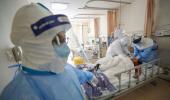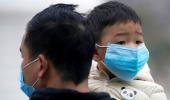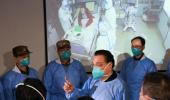After staunchly denying the United States' allegations of coronavirus originating from a bio-lab in its first epicentre Wuhan, Chinese researchers have debunked widely reported view that the deadly virus emanated from a wet market in the city selling live animals.

A leading Chinese virologist, whose mysterious disappearance sparked speculation about the novel coronavirus emanating from the Wuhan Institute of Virology, was for the first time interviewed on Tuesday on China's state television where she warned that such viruses are just the "tip of the iceberg" and expressed regret over science being "politicised".
Shi Zhengli, known as the "Bat Woman" for her passionate research about bats and the viruses associated with them, had early this month refuted "rumours" of her defection to the West on her Chinese social media WeChat account. She also posted nine photos of her recent life.
On Wednesday, Chinese scientists dismissed the reports that the deadly virus which struck Wuhan and later turned into a pandemic paralysing the world originated in the seafood market in Wuhan.
Recent Shanghai-based research targeting local confirmed cases of coronavirus once again proved the attacks on a seafood market in central China's Hubei province for originating the virus are nonsense, state-run Global Times daily reported.
The results of the study, being published on the website of top academic journal Nature on May 20, implied the Huanan Seafood Market in Hubei's capital Wuhan may not be the birthplace of COVID-19,
although the virus outbreak emerged in Wuhan had a strong link to contacts with the market.
Based on the analysis of 112 quality samples from 326 confirmed cases reported in Shanghai between January 20 and February 25, researchers found two major lineages (clade I and clade II) with differential exposure history during the early phase of the outbreak in Wuhan, it said.
There has been no direct evidence that the cross-species COVID-19 transmission originally occurred in the Huanan market in Wuhan, although it was a probable place for human-to-human transmission of
the virus because of its relatively high crowd density, a researcher of the team, who preferred to be anonymous, told state-run Global Times.
"The origin of the virus remains unknown based on current published data," she told the daily. "It still needs scientists' continuous effort in determining the intermediate host of coronavirus, and carrying out comprehensive and detailed virus-tracing studies."
The research team consisted of members from Shanghai's scientific research and medical institutions including the Shanghai Public Health Clinical Centre, Ruijin Hospital affiliated to Shanghai Jiao Tong University School of Medicine and the Shanghai Institute of Haematology.
China is resisting mounting pressure from the US and the leaders of many countries for an inquiry into the origin of the virus, which was initially stated to have emerged from the wet market in Wuhan.
Besides US President Donald Trump, who stepped up demand for an investigation into the origin of the virus and whether it escaped from the Wuhan Institute of Virology, Britain, Australia and German Chancellor Angela Merkel called for more transparency from Beijing on COVID-19 origins.
China's new narrative followed as the World Health Assembly, a decision-making body of the Geneva-based World Health Organisation, recently passed a unanimous resolution to probe the origin of the
virus.
China, which also backed the resolution, called for a comprehensive evaluation of the global COVID-19 response to sum up experiences and address shortcomings after the pandemic is brought under control.











 © 2025
© 2025